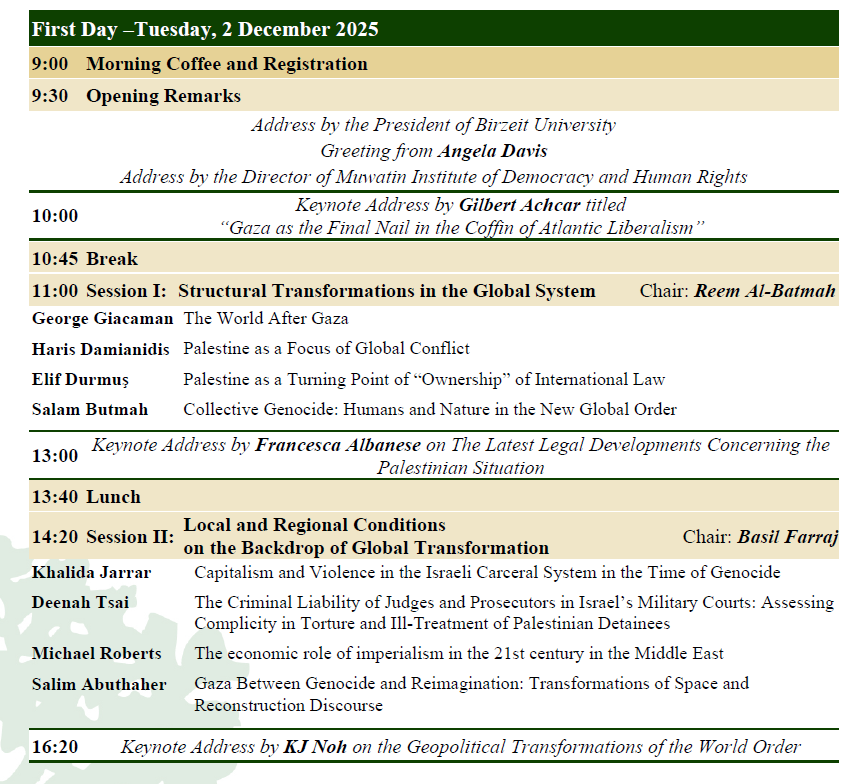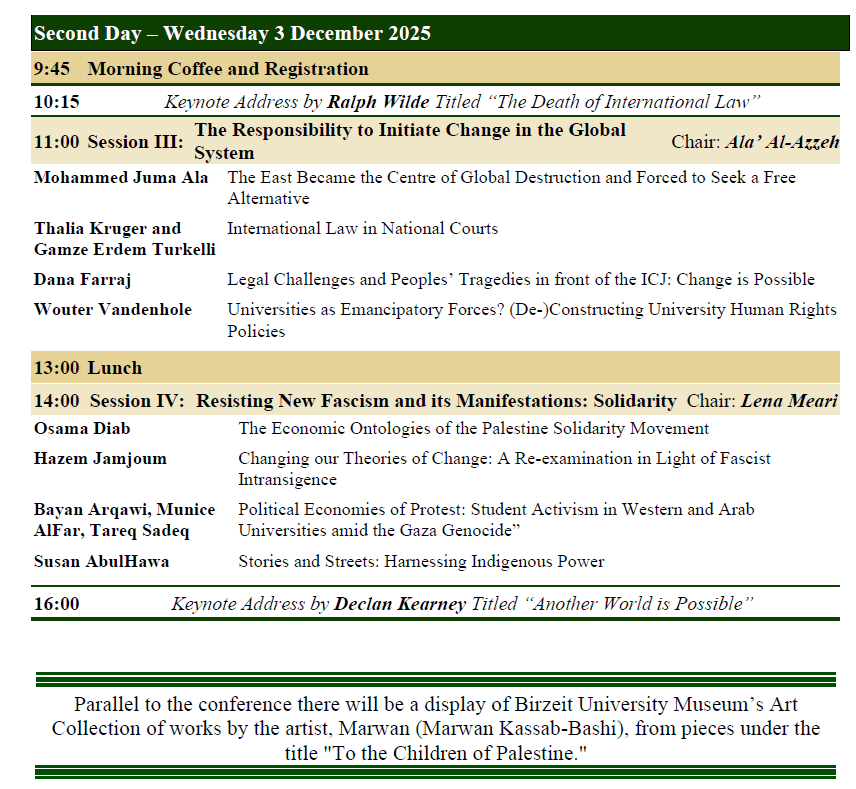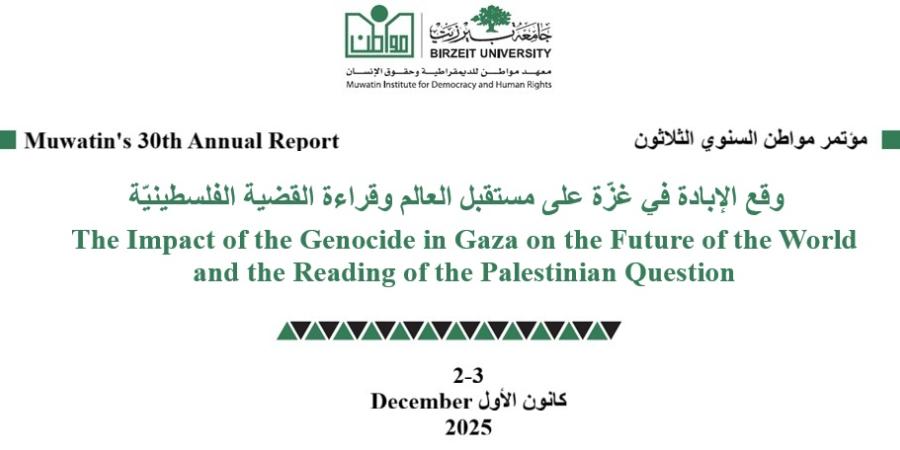Invitation to
Muwatin’s 30th Annual Conference
"The Impact of the Genocide in Gaza on the Future of the World and the Reading of the Palestinian Question"
2-3 December 2025
The conference will be held on campus in Birzeit University and online
Muwatin’s 30th Annual conference aims to understand the Palestinian question within a framework that considers the position of the Palestinian cause in the struggle for the coming global order: the struggle between oligarchy and liberation.
International and local experts and academics from various backgrounds and regions, from a wide range of perspectives will participate in this conference to discuss several issues, including, the structural transformations in the global system, the local and regional conditions on the backdrop of global transformation, the responsibility to initiate change in the global system, and solidarity in the context of resisting new fascism and its manifestations.
The conference will be held on Tuesday and Wednesday, 2 and 3 December 2025, in a hybrid setting at Birzeit University on campus in Hall 243 at Muwatin Institute, and online at the same time. The conference will be broadcasted live on the Muwatin Institute channel on YouTube and through the Institute’s Facebook page, as well as the possibility of participation via Zoom, which requires previous registration by clicking here.
You can access the conference documents including the Conceptual Remarks, the programme, the abstracts, and the participants, through our website (http://muwatin.birzeit.edu/en/conventions), or through Birzeit University’s website (birzeit.edu/en/events), or through our Facebook page (Facebook.com/muwatininstitute1).
Parallel to the conference there will be a display of Birzeit University Museum’s Art Collection of works by the artist, Marwan (Marwan Kassab-Bashi), from pieces under the title "To the Children of Palestine."
The platforms through which the conference can be accessed in the virtual space are:
YouTube: https://www.youtube.com/MuwatinInstituteBirzeitUniversity (We recommend subscribing to the channel to receive reminders of the conference and any other updates.)
Facebook: https://www.facebook.com/MuwatinInstitute1
Zoom Registration:
Note: Simultaneous translation will be provided
Muwatin’s 30th Annual Conference
The Impact of the Genocide in Gaza on the Future of the World and the Reading of the Palestinian Question
Tuesday and Wednesday, 2-3 December 2025
Conceptual Remarks
The world, experiencing unprecedented polarization, is entirely preoccupied with what is happening in the Gaza Strip on two levels: the present (what is happening now) and the future (the consequences of what is happening). This preoccupation is manifested in two dimensions linked to the two sides of a rift dividing the world between fascism, which is emerging day after day from oligarchic neoliberalism, on the one hand; and its victims seeking freedom and justice, on the other. On one side of the rift are the colonial, imperialist, and reactionary elites; while on the other side are the freedom fighters of the world—the victims of rising fascism and those who resist it.
At the current level, the colonial, imperialist, and reactionary elites are preoccupied with deliberations about how to crush the resistance in Gaza; how to bring the Strip's residents to their knees, now that they are no longer able to stand; determining the most appropriate location for their siege; finding the state to which they can be displaced; identifying the most lethal bomb to bombard them; and establishing the most “appropriate” location for their killing: in their homes or in the booby-trapped aid lines. They are considering designing genocidal operations to be more profitable for war profiteers.
As for the fate of the Gaza Strip, these elites are discussing its future by engineering what is known as the "day after," based on their racist and expansionist aims, their political and economic interests (including their rentier ambitions related to gas and reconstruction), and others. They are discussing visions of redistributing the population map through displacement and long-term control of the land, and engineering the form of administration after the massacres. Their thinking is not oriented to the Palestinians' right to govern themselves, but rather to who will govern them, and how the puppet rulers will be operated. These elites are discussing visions close to hallucinations, regarding a future in which the people of Gaza and others will be transformed into a labour force serving investors who will come as new masters. They are also discussing plans for new cities on the ruins of the Strip and its borders, not to serve the welfare of its residents, but rather to serve as infrastructure for the imagined cross-border investments, and transform the Gaza Strip into a large labour force concentration camp. Even "reconstruction" is viewed as a profitable commodity, as if it were the spoils of war.
On the other side of the divide, the freedom fighters of the world, are preoccupied with resistance, and with what can be done to stop the ongoing genocidal massacre as soon as possible. They are searching for ways to rescue, provide relief, and aid the people of Gaza; for ways to stop the deaths from bombing, hunger, thirst, cold, and heat; and for ways to confront the projects of displacement, cleansing, genocide, and destruction, and all the horrors brought about by the hideous colonial machine. They are also busy devising forms of solidarity with the Gazans and their resistance, and ways to expose the colonizer.
As for the future of the Gaza Strip, the freedom fighters are wondering about the resources and capabilities: What will the people of Gaza eat and drink? Where will they sleep? Which schools will their children attend? Which hospitals will they seek medical treatment in? How long will it take to rebuild the Gaza Strip, now that it has been turned into rubble? They are wondering about the prospects for national unity, unity of representation, the sustainability of resistance, and everything necessary to exercise self-determination. They are concerned about the West Bank and fear the next step in the colonial project there. They realize that the questions of the future are not limited to the Gaza Strip; the colonial project extends to all parts of Palestine.
Moreover, those in the freedom camp realize that what is happening in Gaza and in Palestine in general is an advanced expression of the fascist project through which the forces of oligarchic neoliberalism are trying to preserve their gains—preserving the wealth of the 0.1% and their dominance over the lives (and deaths) of the rest of humanity.
The blatant failure to enact international law, and the contempt for human rights principles and humanitarian values, that were unveiled during the genocidal aggression on Gaza also demonstrated that what is happening in Palestine could happen in other parts of the world. Israel has crossed the imaginary red lines, that the liberal elites in the West were bragging about, with the support of these elites in particular. This breach was an announcement of these elites' abandonment of their promises, and even their false slogans. This announcement was confirmed in every assault on civil and political freedoms in countries that had long boasted about these freedoms, and which had overthrown regimes they disliked under the pretext of “protecting” and “defending” these freedoms. They now blatantly violate them every day, even in their own jurisdictions. This is what lies behind the question that has been echoed from the farthest reaches of the East to the farthest reaches of the West: What will the future of the world look like after the Gaza massacres? What is the future of international law after Gaza? Is there room for human rights after Gaza? Is there any meaning for democracy after Gaza?
Neoliberalism triumphed some time ago, but it was only now (as neoliberalism itself is dying) that it announced the burial of the liberal doctrine. The burial announcement came with every weapon, spare part, and statement expressing "understanding" for the Israeli aggression against the Palestinians, with every classification of the aggression under the rubric of “self-defence,” and with every sign, statement, and law that labelled protest against the Israeli genocide an "anti-Semitic" act.
The announcement of the burial of the liberal doctrine became necessary because this doctrine, in its latest iteration, which emerged shortly after World War II, is not conducive to the rise of fascism, the transcendence of liberal democracy, the neutralization of international law (in preparation for replacing law with a law of the jungle, which subordinates right to force, replaces it, and normalizes the hegemony of the strongest), the disposal of the Universal Declaration of Human Rights, and the neutralization of international institutions, stripping them of any authority (even of symbolic authority).
In a world dominated by oligarchic neoliberalism, which tends toward fascism, there are no ingredients for saving the Gaza Strip, nor for preventing the expansion of the Zionist genocidal project to the rest of Palestine, let alone a just solution to the Palestinian question. What Zionism seeks today, supported by its imperialist allies, is to eliminate the Palestinian cause by erasing the Palestinians and enslaving their remnants. It is working to consolidate and normalize a new, transnational apartheid system: different rights, the denial of the right to self-determination, and the denial of sovereignty to Palestinians, Lebanese, Syrians, Iraqis, Iranians, and Jordanians, with successive chain links being added.
Therefore, confronting and halting the oligarchic fascist project is a condition for achieving justice in Palestine. This confrontation is not taking place in Palestine alone, nor only for its sake, but rather on a global level, and for the sake of humanity. This means that Palestine, which today constitutes a hotspot in the struggle for the future of the global order, is one of the raging lines of fire in the war between peace and fascism. The Palestinian cause is not an isolated issue, nor can it be addressed locally. It is a starting point, but its just solution will be a prelude to the end of the fascist project. Palestine can be the prelude to the global downfall of rising fascism before it overwhelms and smears human life in black. Thus, the Palestinian cause has become, today more than ever before, a global issue, and the alignment around it represents a model for the global rift between the forces of hegemony and destruction on the one hand, and the forces of freedom and justice on the other. This places upon the Palestinians a task, greater than ever before: not to liberate themselves with their own hands from the Zionist colonial condition, but rather to provide global liberation forces with a platform for struggle against rising fascism, contributing to the liberation of the Palestinians and shaping the contours of a world free of fascism.
Conference Rubrics
Muwatin’s 30th Annual Conference will discuss these issues within a framework that considers the position of the Palestinian cause in the struggle for the coming global order: the struggle between oligarchy and liberation. The conference will present these issues within three rubrics:
The First Rubric: Palestine as a Focus of Global Conflict
This rubric is devoted to discussing the features of a geopolitical approach to the Palestinian cause as one front in a multi-front global conflict, and defining the characteristics, specificities, and role of this front. This rubric includes a discussion of ways to network the various fronts (solidarity), taking into account regional and global dimensions. It will also discuss the differentiation between governments and peoples regarding solidarity, the consequences of such differentiation on the nature of the networking process and solidarity actions, and the mechanisms for transforming popular solidarity into international action. Furthermore, this rubric is expected to address the conditions and specifications of a global order capable of overcoming the crises of the current system.
The Second Rubric: Formulating the Palestinian Cause in Light of Its Position within the Global Conflict
This rubric will discuss the priorities of the Palestinian liberation struggle and the nature of the national coalition, or national front, capable of functioning in accordance with these priorities. The immersion of the Palestinian struggle in the global movement requires Palestinians to take positions that go beyond exposing Israeli violations and racist colonial practices, but also integrate these positions with advocacy for liberation causes around the world, while maintaining the centrality of the daily reality in Palestine for Palestinians. In addition, this axis is expected to address the conditions for bringing about societal change.
The Third Rubric: The Prospects for the Contribution of Emancipatory Forces to Shaping the Future World
This rubric is devoted to discussing the possibility of shifting the initiative in shaping the contours of the global order from the dominant powers, which suffer from severe, recurring, and multifaceted crises, to the emancipatory forces, which have been marginalized by these powers over the past decades, particularly since the consolidation of the neoliberal system in the early 1990s, the collapse of the socialist bloc, and the decline of Third-Worldism. Specifically, this rubric seeks to examine the possibilities and opportunities for introducing radical changes to the human rights system (while preserving the sublime principles on which it is based); and the possibility of presenting and adopting alternative models of democracy, based on the realization of the public will, distinct from liberal democracy and centralized democracy. It is hoped that this axis will examine the existence of nuclei of alternative legal and political systems in contemporary history.



